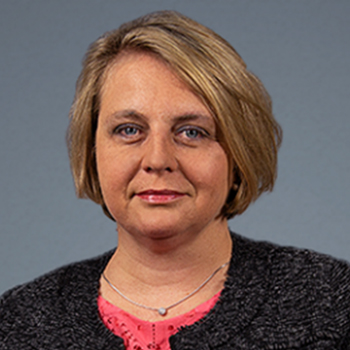Monika Niewczas, MD, PhD, MPH
-
Academic Faculty, Researcher
-
Genetics and Epidemiology
Investigator
Assistant Professor of Medicine, Harvard Medical School
Dr. Monika Niewczas is an Investigator in the Section on Genetics and Epidemiology at Joslin Diabetes Center and an Assistant Professor of Medicine at Harvard Medical School, Boston. She serves as a Joslin site PI for Harvard Catalyst Biostatistics and as co-Director of the Bioinformatics and Biostatistics Core at Joslin. Dr. Niewczas holds three advanced professional degrees. She earned her M.D. with high honors and Ph.D. in Clinical Research from the Medical University of Warsaw, Poland, where she also completed an internship and residency in internal medicine at the affiliated teaching hospital. She obtained her M.P.H. in Clinical Effectiveness at Harvard T.H. Chan School of Public Health. Dr. Niewczas trained as a postdoctoral research fellow and then as a research associate in Dr. Andrzej Krolewski’s laboratory before starting her own laboratory as an independent investigator at Joslin.
The Niewczas laboratory uses hypothesis-driven and unsupervised high-throughput approaches together with advanced clinical epidemiology tools to search for potential determinants of chronic diabetic complications with an emphasis on kidney disease and neuropathy. During her 15-year career at Joslin, Dr. Niewczas has contributed to advances in our understanding of the mechanisms driving progressive development of diabetic kidney complications, utilizing targeted and untargeted proteomic or metabolomics approaches. As a Principal Investigator (PI), Dr. Niewczas has been granted the highly competitive 5-year JDRF Career Development Award, distinguished further with the Michelle Olmsted award by JDRF; as a PI she was also recently awarded the Boston Area Diabetes Endocrinology Research Center (BADERC) Pilot and Feasibility grant as well as the “Passion to Find a Cure” BEATSON Foundation grant. She has been a Co-Investigator of the multi-center JDRF-funded Diabetic Nephropathy Biomarker Collaborative Initiative (DNBio). As an extremely prolific young researcher, she has published more than 45 peer-reviewed articles; she was the first or leading author of 15 published manuscripts including such journals as Nature Medicine among others. Dr. Niewczas has presented more than 30 talks including invited lectures and oral conference presentations both nationally and internationally. Recent presentations of her work at scientific conferences were distinguished with the President’s select abstract at the American Diabetes Association meeting, 2018 and at the Spring 2019 meeting of the National Kidney Foundation.
The overarching goal of the Niewczas laboratory is to conduct innovative translational research to accelerate discoveries that will ultimately offer an individualized treatment of patients with diabetes. Dr. Niewczas applies cutting-edge molecular technologies to large epidemiological human studies, allowing her to look into the disease process at a much higher resolution than previously attainable. “The real voyage of discovery consists not in seeking new landscapes, but in having new eyes.” - Marcel Proust. Current areas of investigation include applications of high-throughput technologies such as proteomics, metabolomics or single-cell RNAseq to human studies on chronic diabetic complications. Specific projects include an evaluation of the proteome-wide local inflammation as a driver of progressive diabetic kidney disease with a major focus on the complement system; cell subpopulation protein and RNA signatures of diabetic kidney complications and metabolomics determinants of albuminuria outcomes. These activities are complemented by a newly launched cohort study: “Molecular Determinants of Diabetic Complications” (MDC) of subjects with well-ascertained phenotypes of a broader spectrum of diabetic complications that expands biological material to non-routine sample collection. Dr. Niewczas is a recognized expert in molecular epidemiology-based approaches. Her previous discoveries made together with her former mentor, Dr. Andrzej Krolewski, provided key advances into the determinants of diabetic kidney complications. The most significant results of this work are: i) Identifying TNFRs as robust biomarkers predicting kidney complications in diabetes ten years in advance – targeted and untargeted proteomic approaches. The Joslin Kidney Study was the first to identify a highly specific inflammatory driver of the disease process, a blood protein marker (TNFR) as a predictor of prospective kidney failure risk. This seminal work resulted in 10 peer-reviewed publications, with Dr. Niewczas’ first or leading authorship in 6 of them (Clin J Am Soc Nephrol 2009, two side-by-side articles in J Am Soc Nephrol 2012 with an accompanying editorial, Nat Med 2019 among others). These extremely robust findings were replicated further in a number of independent large cohort studies; ii) Mechanisms underlying progressive diabetic kidney disease. Dr. Niewczas’ work with Dr. Krolewski has demonstrated that tubular injury is involved in the disease process earlier than previously assumed and it led to a number of peer-reviewed publications; iii) Metabolomic determinants of progressive diabetic kidney disease. Dr. Niewczas’ recent publications employing high-throughput metabolomics demonstrated that the levels of certain metabolites that are still within the normal range in the blood, may determine who will develop kidney failure 10 years later (Niewczas et al, Kidney Int. 2014, Niewczas et al. Diabetes Care 2017; corresponding author in both).
Research Interests: Translational Research, Molecular Epidemiology, Prospective Determinants of Diabetic Complications, Proteomics, Metabolomics, Biomarkers
Medical School: Medical University of Warsaw
Doctorate: Medical University of Warsaw
Master of Public Health: Harvard T.H. Chan School of Public Health
Fellowship: Joslin Diabetes Center and Harvard Medical School
- 1999 MD, Graduation cum Laude from Medical University, Warsaw
- 2009 Keystone Symposia Travel Scholarship award, NIH/ NIDDK
- 2011 Pilot and Feasibility Grant Award, NIDDK, DRC
- 2011 Young Investigator Travel Grant Award American Diabetes Association, 71th Scientific Session
- 2015 Michelle Olmsted award for the distinguished grant application, Career Development Award recipient from the JDRF Foundation
- 2018 President’s select abstract, American Diabetes Association, 78st Scientific Session
- 2019 Boston Area Diabetes Endocrinology Research Center Pilot and Feasibility grant recipient
- 2019 “Passion to Find a Cure” BEATSON Foundation grant recipient

